Legal & Ethical Framework: Legislation in Travel and Tourism Sector
VerifiedAdded on 2024/05/29
|21
|4749
|190
Report
AI Summary
This report provides a comprehensive analysis of the legal and ethical framework governing the travel and tourism sector, focusing on the UK. It delves into the legal and regulatory aspects, including surface, sea, and air transport laws, health and safety regulations, and consumer protection legislation. The report evaluates the impact of these regulations on tour operators and travel agencies, examining equality legislation and contract law. Furthermore, it explores ethical dilemmas faced by the industry and analyzes the Corporate Social Responsibility (CSR) policies of travel and tourism businesses, highlighting the importance of ethical conduct and sustainability within the sector. The report concludes by emphasizing the need for continuous improvement in legal and ethical practices to foster a responsible and sustainable tourism industry. Desklib provides a platform for students to access similar solved assignments and past papers.
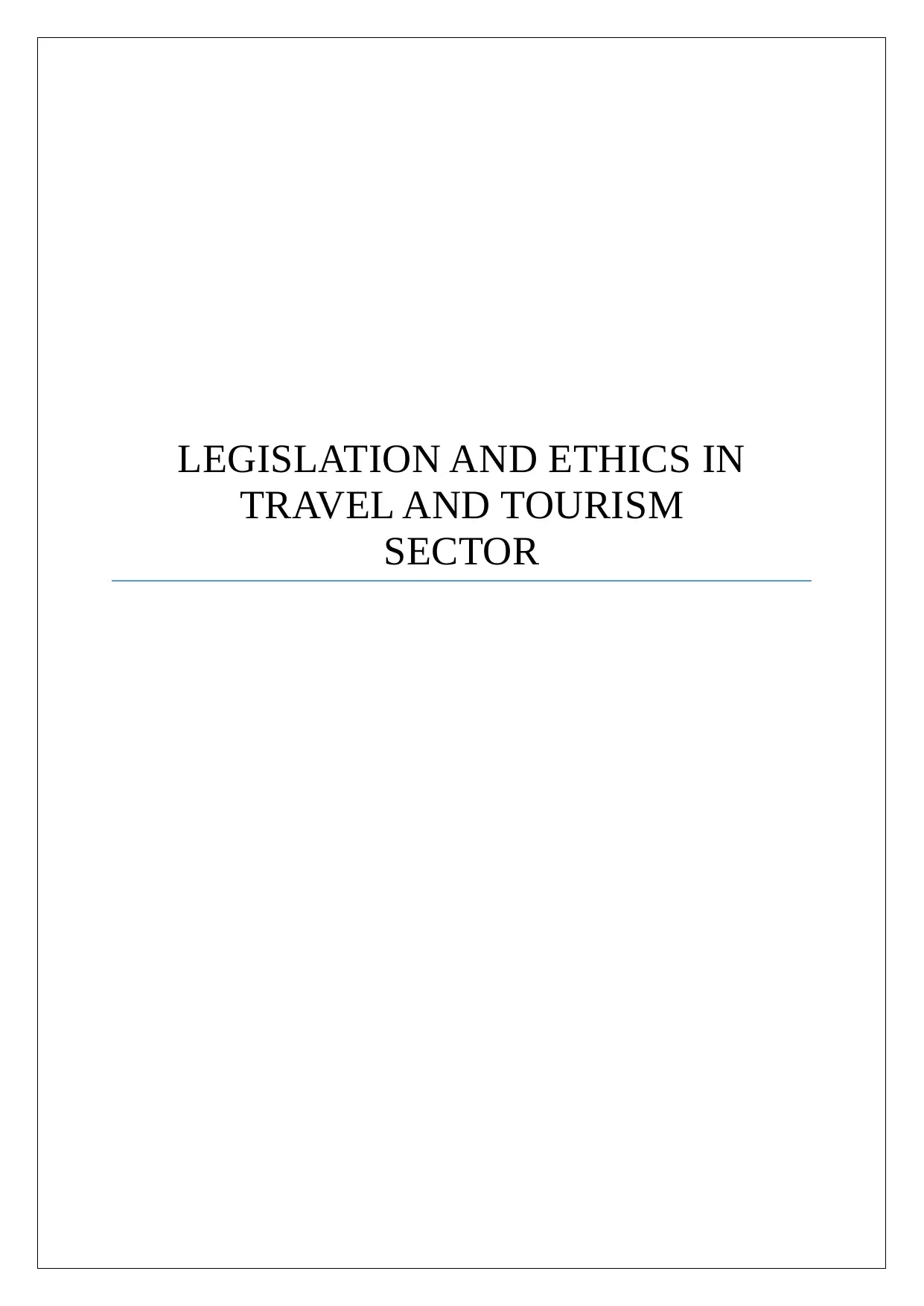
LEGISLATION AND ETHICS IN
TRAVEL AND TOURISM
SECTOR
TRAVEL AND TOURISM
SECTOR
Paraphrase This Document
Need a fresh take? Get an instant paraphrase of this document with our AI Paraphraser
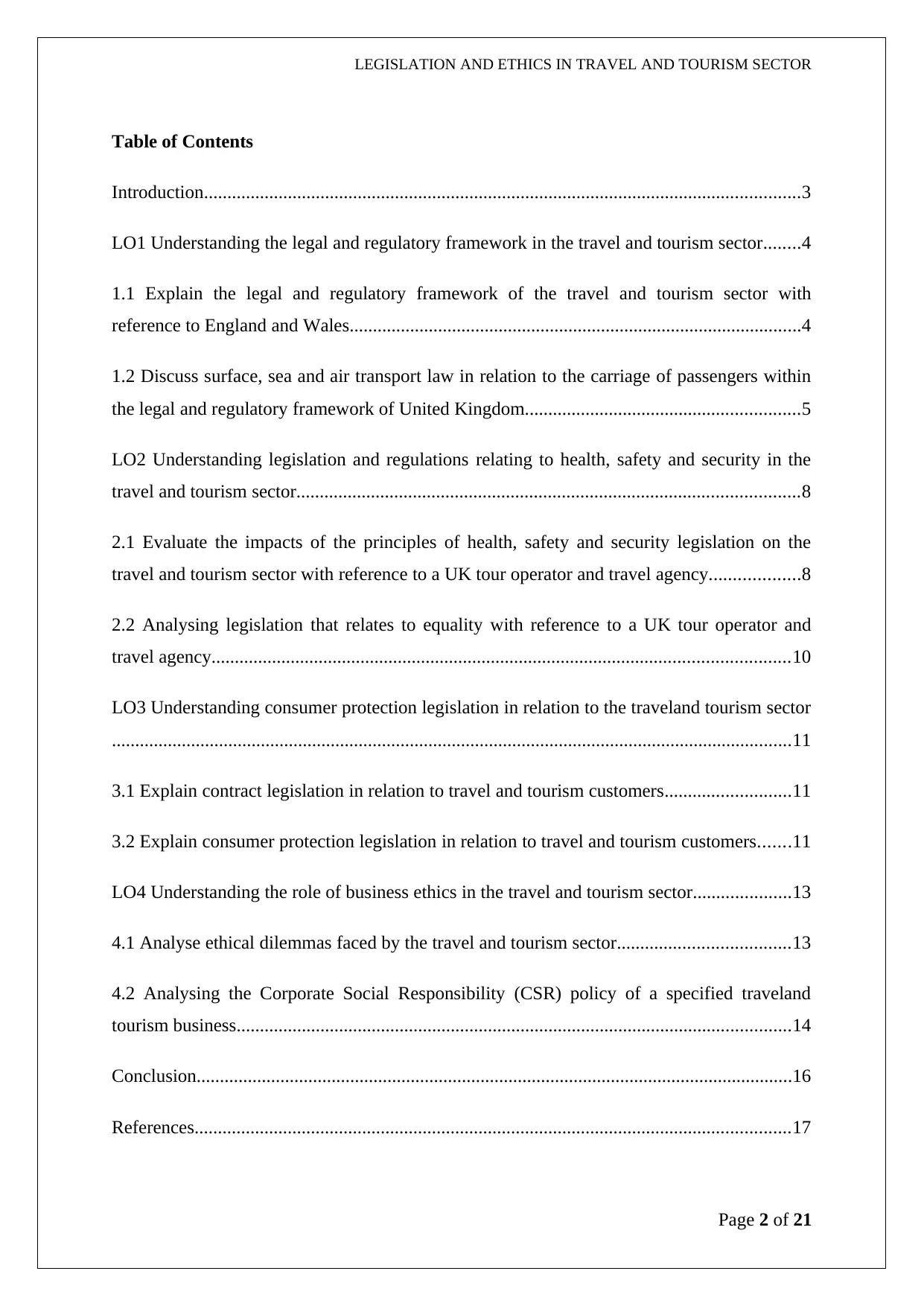
LEGISLATION AND ETHICS IN TRAVEL AND TOURISM SECTOR
Table of Contents
Introduction................................................................................................................................3
LO1 Understanding the legal and regulatory framework in the travel and tourism sector........4
1.1 Explain the legal and regulatory framework of the travel and tourism sector with
reference to England and Wales.................................................................................................4
1.2 Discuss surface, sea and air transport law in relation to the carriage of passengers within
the legal and regulatory framework of United Kingdom...........................................................5
LO2 Understanding legislation and regulations relating to health, safety and security in the
travel and tourism sector............................................................................................................8
2.1 Evaluate the impacts of the principles of health, safety and security legislation on the
travel and tourism sector with reference to a UK tour operator and travel agency...................8
2.2 Analysing legislation that relates to equality with reference to a UK tour operator and
travel agency............................................................................................................................10
LO3 Understanding consumer protection legislation in relation to the traveland tourism sector
..................................................................................................................................................11
3.1 Explain contract legislation in relation to travel and tourism customers...........................11
3.2 Explain consumer protection legislation in relation to travel and tourism customers.......11
LO4 Understanding the role of business ethics in the travel and tourism sector.....................13
4.1 Analyse ethical dilemmas faced by the travel and tourism sector.....................................13
4.2 Analysing the Corporate Social Responsibility (CSR) policy of a specified traveland
tourism business.......................................................................................................................14
Conclusion................................................................................................................................16
References................................................................................................................................17
Page 2 of 21
Table of Contents
Introduction................................................................................................................................3
LO1 Understanding the legal and regulatory framework in the travel and tourism sector........4
1.1 Explain the legal and regulatory framework of the travel and tourism sector with
reference to England and Wales.................................................................................................4
1.2 Discuss surface, sea and air transport law in relation to the carriage of passengers within
the legal and regulatory framework of United Kingdom...........................................................5
LO2 Understanding legislation and regulations relating to health, safety and security in the
travel and tourism sector............................................................................................................8
2.1 Evaluate the impacts of the principles of health, safety and security legislation on the
travel and tourism sector with reference to a UK tour operator and travel agency...................8
2.2 Analysing legislation that relates to equality with reference to a UK tour operator and
travel agency............................................................................................................................10
LO3 Understanding consumer protection legislation in relation to the traveland tourism sector
..................................................................................................................................................11
3.1 Explain contract legislation in relation to travel and tourism customers...........................11
3.2 Explain consumer protection legislation in relation to travel and tourism customers.......11
LO4 Understanding the role of business ethics in the travel and tourism sector.....................13
4.1 Analyse ethical dilemmas faced by the travel and tourism sector.....................................13
4.2 Analysing the Corporate Social Responsibility (CSR) policy of a specified traveland
tourism business.......................................................................................................................14
Conclusion................................................................................................................................16
References................................................................................................................................17
Page 2 of 21
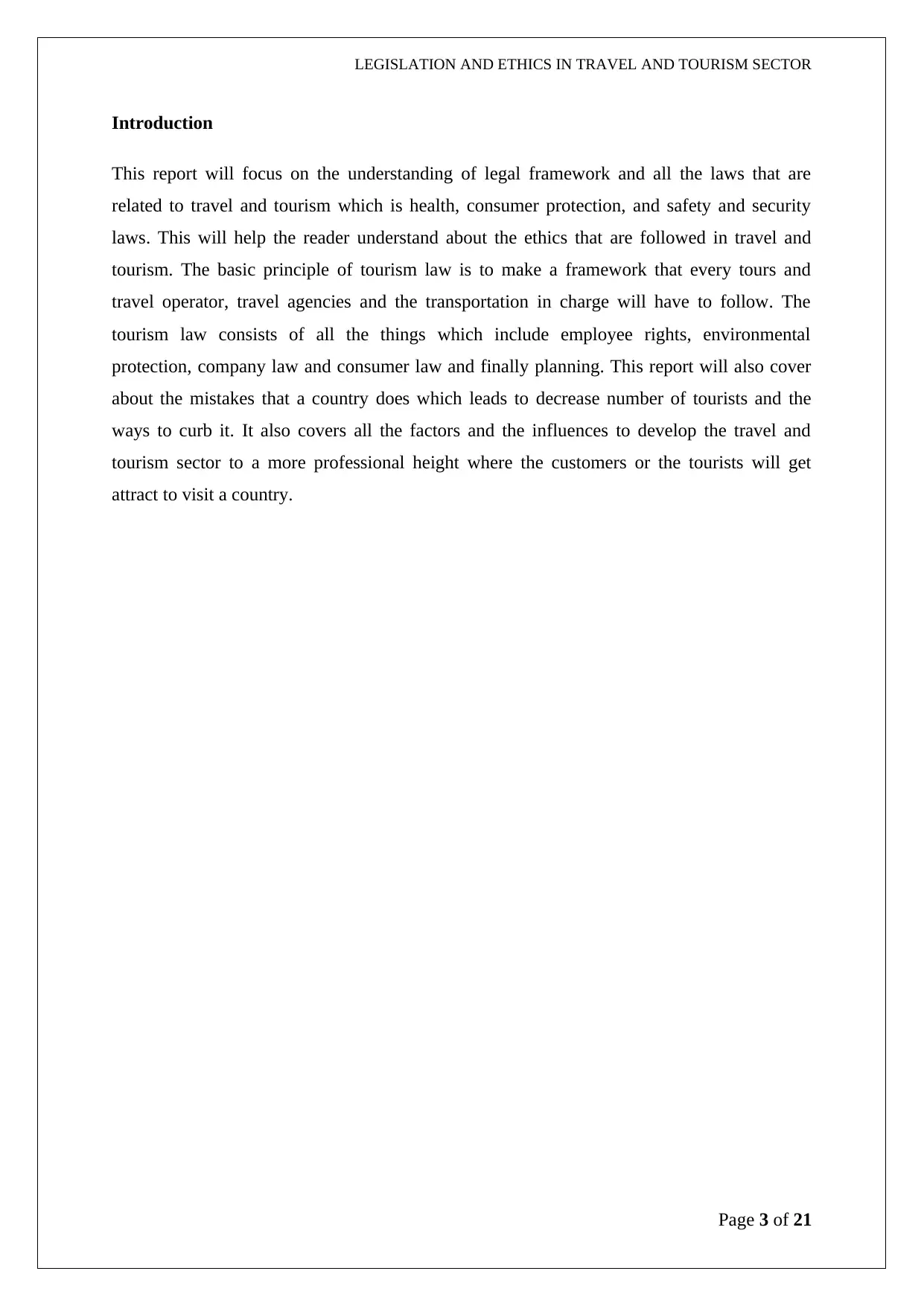
LEGISLATION AND ETHICS IN TRAVEL AND TOURISM SECTOR
Introduction
This report will focus on the understanding of legal framework and all the laws that are
related to travel and tourism which is health, consumer protection, and safety and security
laws. This will help the reader understand about the ethics that are followed in travel and
tourism. The basic principle of tourism law is to make a framework that every tours and
travel operator, travel agencies and the transportation in charge will have to follow. The
tourism law consists of all the things which include employee rights, environmental
protection, company law and consumer law and finally planning. This report will also cover
about the mistakes that a country does which leads to decrease number of tourists and the
ways to curb it. It also covers all the factors and the influences to develop the travel and
tourism sector to a more professional height where the customers or the tourists will get
attract to visit a country.
Page 3 of 21
Introduction
This report will focus on the understanding of legal framework and all the laws that are
related to travel and tourism which is health, consumer protection, and safety and security
laws. This will help the reader understand about the ethics that are followed in travel and
tourism. The basic principle of tourism law is to make a framework that every tours and
travel operator, travel agencies and the transportation in charge will have to follow. The
tourism law consists of all the things which include employee rights, environmental
protection, company law and consumer law and finally planning. This report will also cover
about the mistakes that a country does which leads to decrease number of tourists and the
ways to curb it. It also covers all the factors and the influences to develop the travel and
tourism sector to a more professional height where the customers or the tourists will get
attract to visit a country.
Page 3 of 21
⊘ This is a preview!⊘
Do you want full access?
Subscribe today to unlock all pages.

Trusted by 1+ million students worldwide
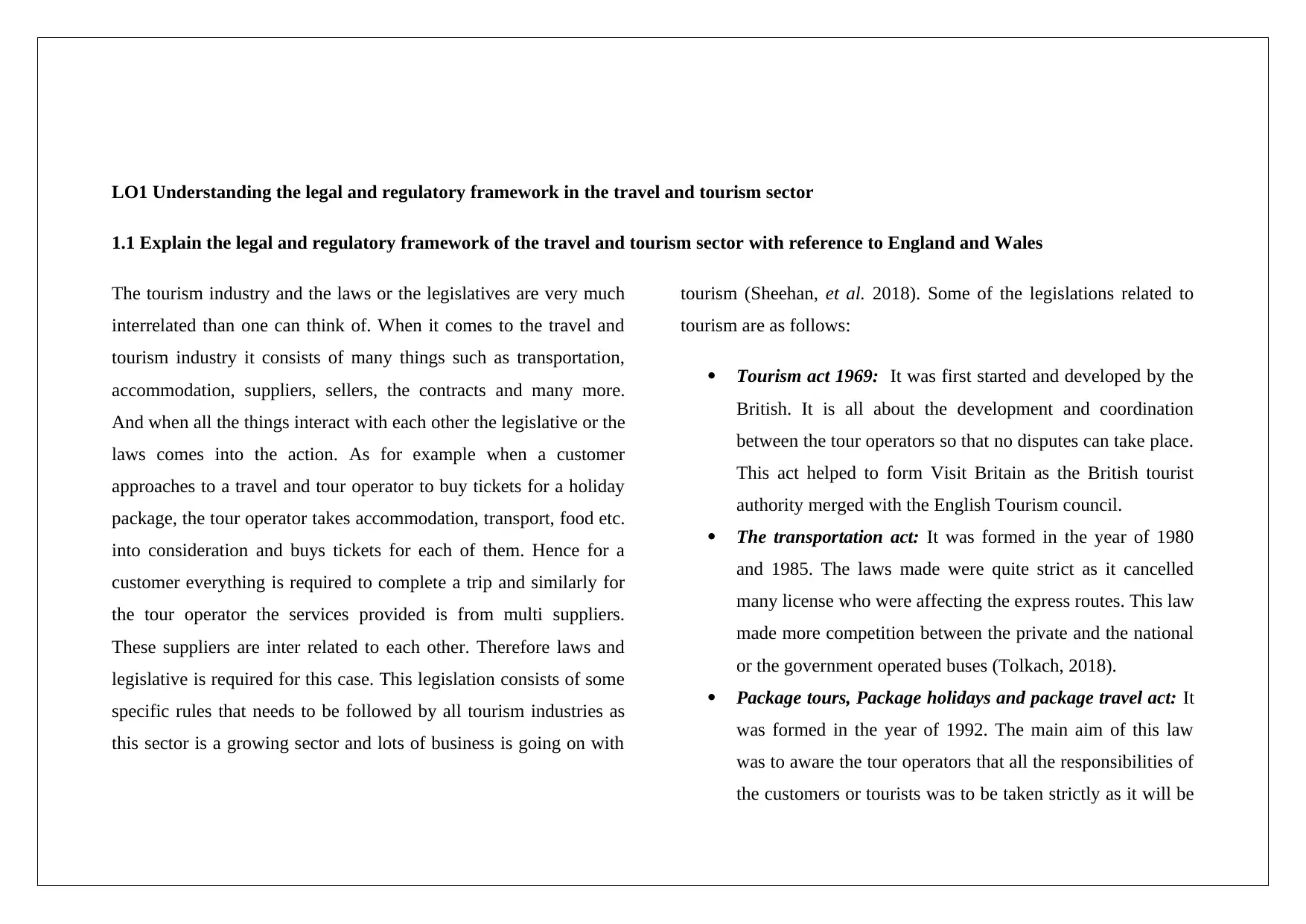
LO1 Understanding the legal and regulatory framework in the travel and tourism sector
1.1 Explain the legal and regulatory framework of the travel and tourism sector with reference to England and Wales
The tourism industry and the laws or the legislatives are very much
interrelated than one can think of. When it comes to the travel and
tourism industry it consists of many things such as transportation,
accommodation, suppliers, sellers, the contracts and many more.
And when all the things interact with each other the legislative or the
laws comes into the action. As for example when a customer
approaches to a travel and tour operator to buy tickets for a holiday
package, the tour operator takes accommodation, transport, food etc.
into consideration and buys tickets for each of them. Hence for a
customer everything is required to complete a trip and similarly for
the tour operator the services provided is from multi suppliers.
These suppliers are inter related to each other. Therefore laws and
legislative is required for this case. This legislation consists of some
specific rules that needs to be followed by all tourism industries as
this sector is a growing sector and lots of business is going on with
tourism (Sheehan, et al. 2018). Some of the legislations related to
tourism are as follows:
Tourism act 1969: It was first started and developed by the
British. It is all about the development and coordination
between the tour operators so that no disputes can take place.
This act helped to form Visit Britain as the British tourist
authority merged with the English Tourism council.
The transportation act: It was formed in the year of 1980
and 1985. The laws made were quite strict as it cancelled
many license who were affecting the express routes. This law
made more competition between the private and the national
or the government operated buses (Tolkach, 2018).
Package tours, Package holidays and package travel act: It
was formed in the year of 1992. The main aim of this law
was to aware the tour operators that all the responsibilities of
the customers or tourists was to be taken strictly as it will be
1.1 Explain the legal and regulatory framework of the travel and tourism sector with reference to England and Wales
The tourism industry and the laws or the legislatives are very much
interrelated than one can think of. When it comes to the travel and
tourism industry it consists of many things such as transportation,
accommodation, suppliers, sellers, the contracts and many more.
And when all the things interact with each other the legislative or the
laws comes into the action. As for example when a customer
approaches to a travel and tour operator to buy tickets for a holiday
package, the tour operator takes accommodation, transport, food etc.
into consideration and buys tickets for each of them. Hence for a
customer everything is required to complete a trip and similarly for
the tour operator the services provided is from multi suppliers.
These suppliers are inter related to each other. Therefore laws and
legislative is required for this case. This legislation consists of some
specific rules that needs to be followed by all tourism industries as
this sector is a growing sector and lots of business is going on with
tourism (Sheehan, et al. 2018). Some of the legislations related to
tourism are as follows:
Tourism act 1969: It was first started and developed by the
British. It is all about the development and coordination
between the tour operators so that no disputes can take place.
This act helped to form Visit Britain as the British tourist
authority merged with the English Tourism council.
The transportation act: It was formed in the year of 1980
and 1985. The laws made were quite strict as it cancelled
many license who were affecting the express routes. This law
made more competition between the private and the national
or the government operated buses (Tolkach, 2018).
Package tours, Package holidays and package travel act: It
was formed in the year of 1992. The main aim of this law
was to aware the tour operators that all the responsibilities of
the customers or tourists was to be taken strictly as it will be
Paraphrase This Document
Need a fresh take? Get an instant paraphrase of this document with our AI Paraphraser
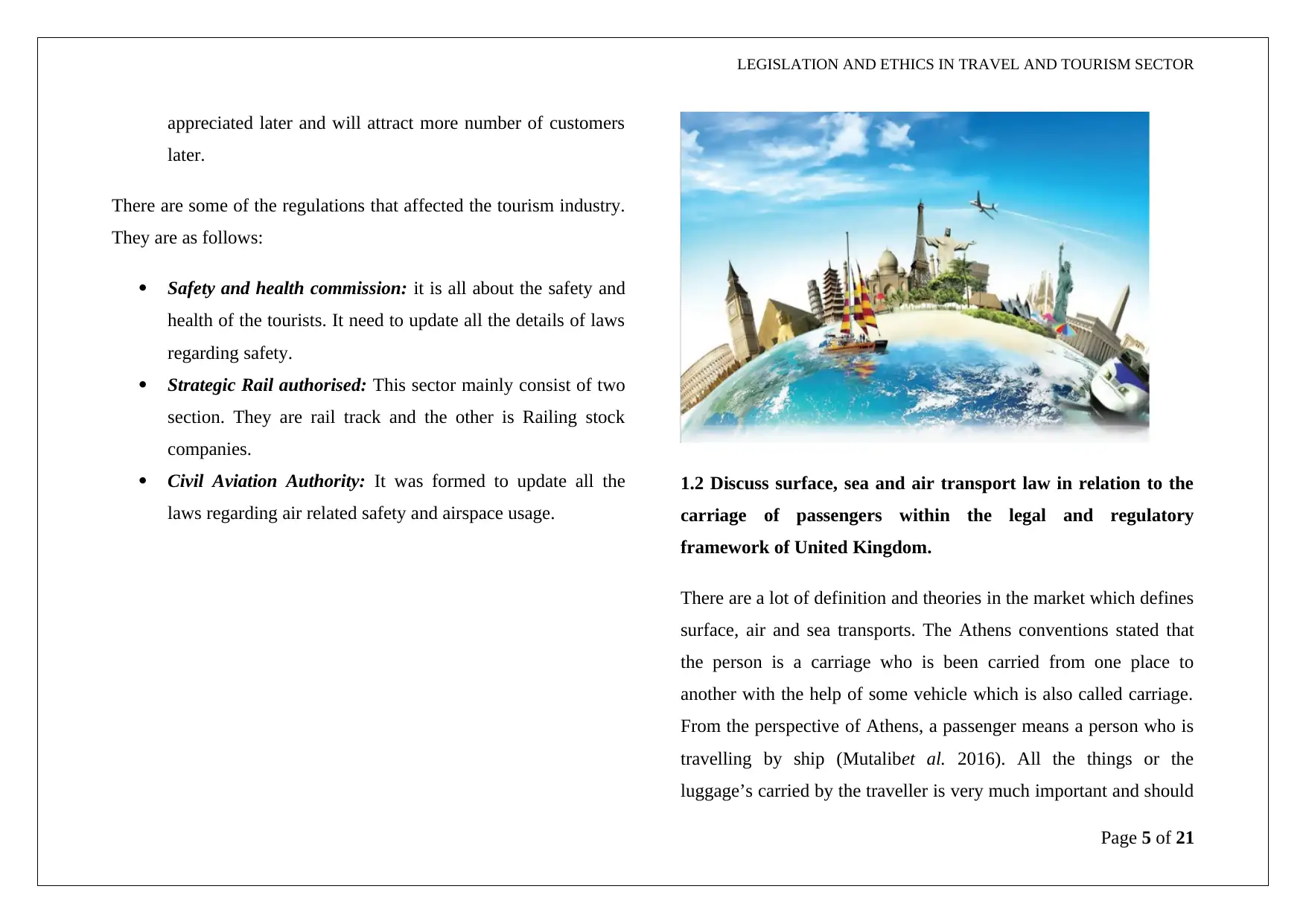
LEGISLATION AND ETHICS IN TRAVEL AND TOURISM SECTOR
appreciated later and will attract more number of customers
later.
There are some of the regulations that affected the tourism industry.
They are as follows:
Safety and health commission: it is all about the safety and
health of the tourists. It need to update all the details of laws
regarding safety.
Strategic Rail authorised: This sector mainly consist of two
section. They are rail track and the other is Railing stock
companies.
Civil Aviation Authority: It was formed to update all the
laws regarding air related safety and airspace usage.
1.2 Discuss surface, sea and air transport law in relation to the
carriage of passengers within the legal and regulatory
framework of United Kingdom.
There are a lot of definition and theories in the market which defines
surface, air and sea transports. The Athens conventions stated that
the person is a carriage who is been carried from one place to
another with the help of some vehicle which is also called carriage.
From the perspective of Athens, a passenger means a person who is
travelling by ship (Mutalibet al. 2016). All the things or the
luggage’s carried by the traveller is very much important and should
Page 5 of 21
appreciated later and will attract more number of customers
later.
There are some of the regulations that affected the tourism industry.
They are as follows:
Safety and health commission: it is all about the safety and
health of the tourists. It need to update all the details of laws
regarding safety.
Strategic Rail authorised: This sector mainly consist of two
section. They are rail track and the other is Railing stock
companies.
Civil Aviation Authority: It was formed to update all the
laws regarding air related safety and airspace usage.
1.2 Discuss surface, sea and air transport law in relation to the
carriage of passengers within the legal and regulatory
framework of United Kingdom.
There are a lot of definition and theories in the market which defines
surface, air and sea transports. The Athens conventions stated that
the person is a carriage who is been carried from one place to
another with the help of some vehicle which is also called carriage.
From the perspective of Athens, a passenger means a person who is
travelling by ship (Mutalibet al. 2016). All the things or the
luggage’s carried by the traveller is very much important and should
Page 5 of 21
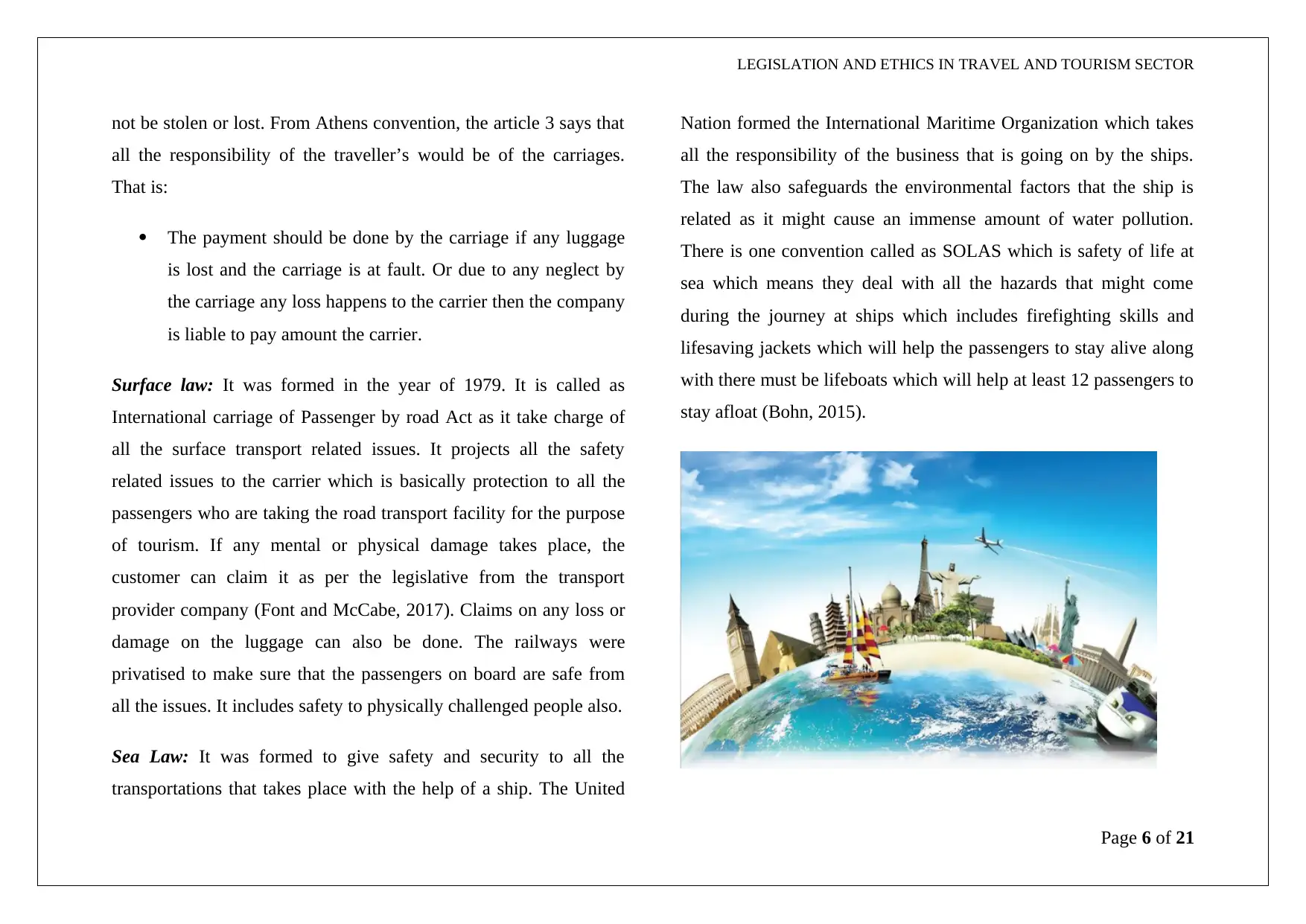
LEGISLATION AND ETHICS IN TRAVEL AND TOURISM SECTOR
not be stolen or lost. From Athens convention, the article 3 says that
all the responsibility of the traveller’s would be of the carriages.
That is:
The payment should be done by the carriage if any luggage
is lost and the carriage is at fault. Or due to any neglect by
the carriage any loss happens to the carrier then the company
is liable to pay amount the carrier.
Surface law: It was formed in the year of 1979. It is called as
International carriage of Passenger by road Act as it take charge of
all the surface transport related issues. It projects all the safety
related issues to the carrier which is basically protection to all the
passengers who are taking the road transport facility for the purpose
of tourism. If any mental or physical damage takes place, the
customer can claim it as per the legislative from the transport
provider company (Font and McCabe, 2017). Claims on any loss or
damage on the luggage can also be done. The railways were
privatised to make sure that the passengers on board are safe from
all the issues. It includes safety to physically challenged people also.
Sea Law: It was formed to give safety and security to all the
transportations that takes place with the help of a ship. The United
Nation formed the International Maritime Organization which takes
all the responsibility of the business that is going on by the ships.
The law also safeguards the environmental factors that the ship is
related as it might cause an immense amount of water pollution.
There is one convention called as SOLAS which is safety of life at
sea which means they deal with all the hazards that might come
during the journey at ships which includes firefighting skills and
lifesaving jackets which will help the passengers to stay alive along
with there must be lifeboats which will help at least 12 passengers to
stay afloat (Bohn, 2015).
Page 6 of 21
not be stolen or lost. From Athens convention, the article 3 says that
all the responsibility of the traveller’s would be of the carriages.
That is:
The payment should be done by the carriage if any luggage
is lost and the carriage is at fault. Or due to any neglect by
the carriage any loss happens to the carrier then the company
is liable to pay amount the carrier.
Surface law: It was formed in the year of 1979. It is called as
International carriage of Passenger by road Act as it take charge of
all the surface transport related issues. It projects all the safety
related issues to the carrier which is basically protection to all the
passengers who are taking the road transport facility for the purpose
of tourism. If any mental or physical damage takes place, the
customer can claim it as per the legislative from the transport
provider company (Font and McCabe, 2017). Claims on any loss or
damage on the luggage can also be done. The railways were
privatised to make sure that the passengers on board are safe from
all the issues. It includes safety to physically challenged people also.
Sea Law: It was formed to give safety and security to all the
transportations that takes place with the help of a ship. The United
Nation formed the International Maritime Organization which takes
all the responsibility of the business that is going on by the ships.
The law also safeguards the environmental factors that the ship is
related as it might cause an immense amount of water pollution.
There is one convention called as SOLAS which is safety of life at
sea which means they deal with all the hazards that might come
during the journey at ships which includes firefighting skills and
lifesaving jackets which will help the passengers to stay alive along
with there must be lifeboats which will help at least 12 passengers to
stay afloat (Bohn, 2015).
Page 6 of 21
⊘ This is a preview!⊘
Do you want full access?
Subscribe today to unlock all pages.

Trusted by 1+ million students worldwide
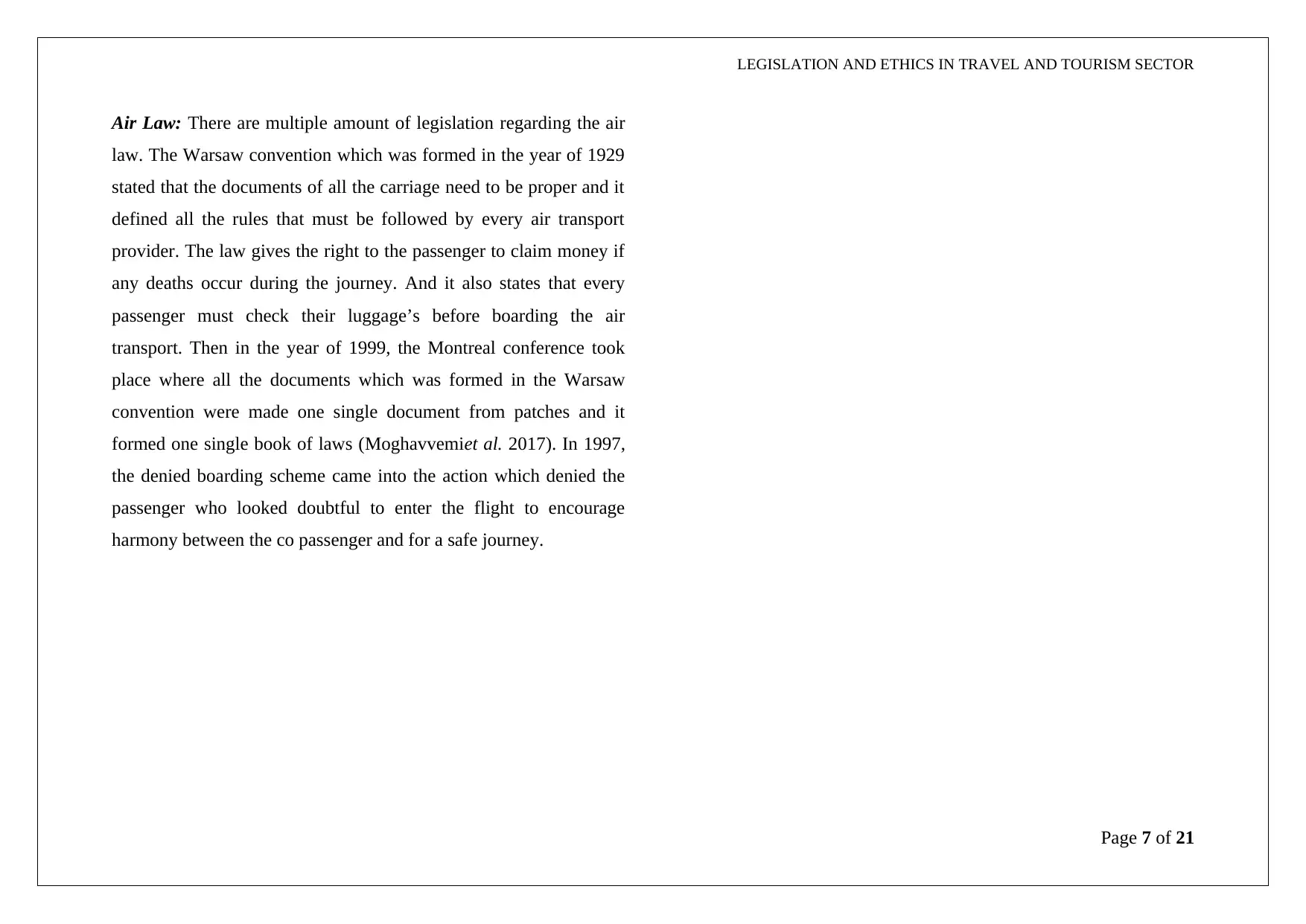
LEGISLATION AND ETHICS IN TRAVEL AND TOURISM SECTOR
Air Law: There are multiple amount of legislation regarding the air
law. The Warsaw convention which was formed in the year of 1929
stated that the documents of all the carriage need to be proper and it
defined all the rules that must be followed by every air transport
provider. The law gives the right to the passenger to claim money if
any deaths occur during the journey. And it also states that every
passenger must check their luggage’s before boarding the air
transport. Then in the year of 1999, the Montreal conference took
place where all the documents which was formed in the Warsaw
convention were made one single document from patches and it
formed one single book of laws (Moghavvemiet al. 2017). In 1997,
the denied boarding scheme came into the action which denied the
passenger who looked doubtful to enter the flight to encourage
harmony between the co passenger and for a safe journey.
Page 7 of 21
Air Law: There are multiple amount of legislation regarding the air
law. The Warsaw convention which was formed in the year of 1929
stated that the documents of all the carriage need to be proper and it
defined all the rules that must be followed by every air transport
provider. The law gives the right to the passenger to claim money if
any deaths occur during the journey. And it also states that every
passenger must check their luggage’s before boarding the air
transport. Then in the year of 1999, the Montreal conference took
place where all the documents which was formed in the Warsaw
convention were made one single document from patches and it
formed one single book of laws (Moghavvemiet al. 2017). In 1997,
the denied boarding scheme came into the action which denied the
passenger who looked doubtful to enter the flight to encourage
harmony between the co passenger and for a safe journey.
Page 7 of 21
Paraphrase This Document
Need a fresh take? Get an instant paraphrase of this document with our AI Paraphraser
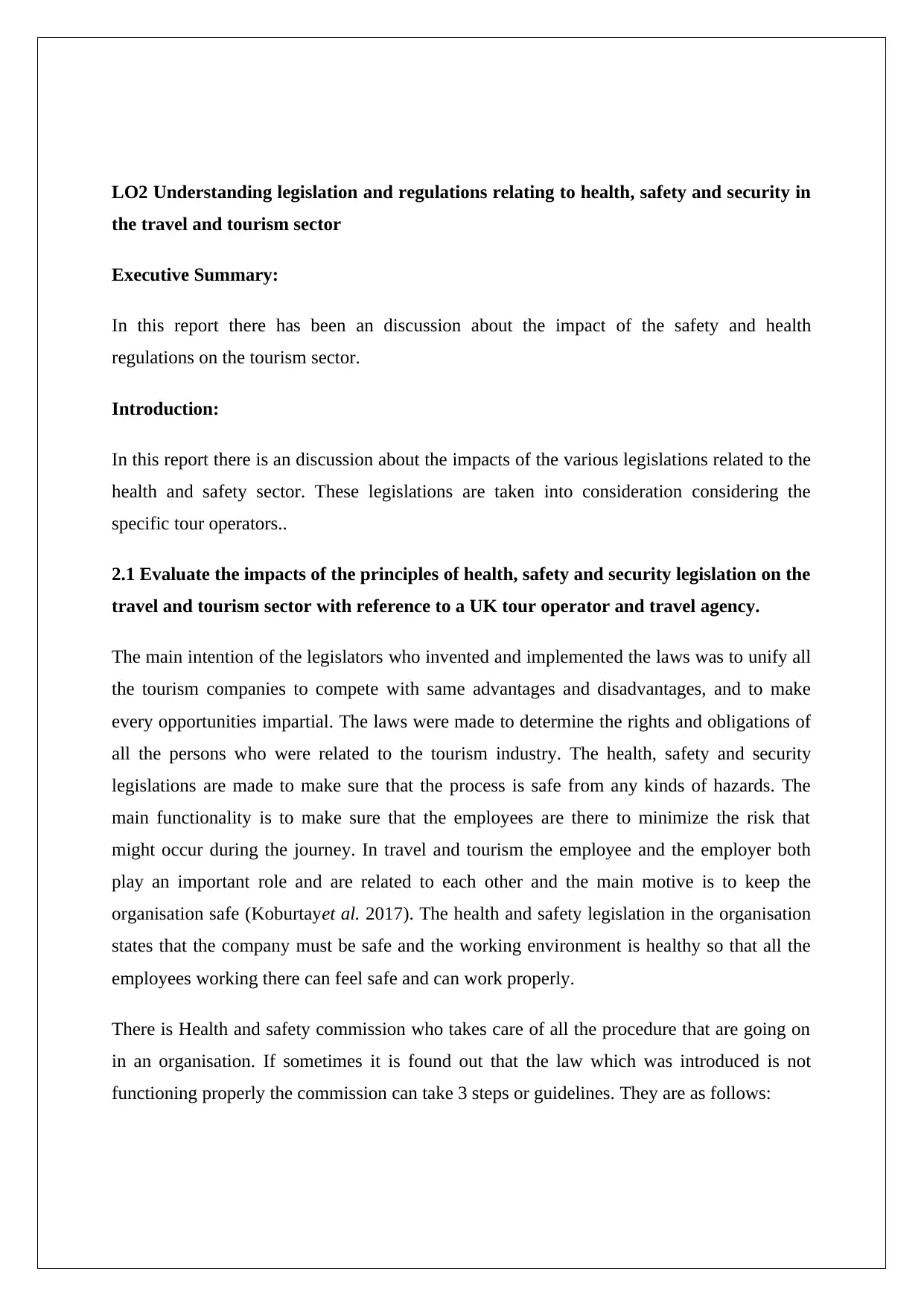
LO2 Understanding legislation and regulations relating to health, safety and security in
the travel and tourism sector
Executive Summary:
In this report there has been an discussion about the impact of the safety and health
regulations on the tourism sector.
Introduction:
In this report there is an discussion about the impacts of the various legislations related to the
health and safety sector. These legislations are taken into consideration considering the
specific tour operators..
2.1 Evaluate the impacts of the principles of health, safety and security legislation on the
travel and tourism sector with reference to a UK tour operator and travel agency.
The main intention of the legislators who invented and implemented the laws was to unify all
the tourism companies to compete with same advantages and disadvantages, and to make
every opportunities impartial. The laws were made to determine the rights and obligations of
all the persons who were related to the tourism industry. The health, safety and security
legislations are made to make sure that the process is safe from any kinds of hazards. The
main functionality is to make sure that the employees are there to minimize the risk that
might occur during the journey. In travel and tourism the employee and the employer both
play an important role and are related to each other and the main motive is to keep the
organisation safe (Koburtayet al. 2017). The health and safety legislation in the organisation
states that the company must be safe and the working environment is healthy so that all the
employees working there can feel safe and can work properly.
There is Health and safety commission who takes care of all the procedure that are going on
in an organisation. If sometimes it is found out that the law which was introduced is not
functioning properly the commission can take 3 steps or guidelines. They are as follows:
the travel and tourism sector
Executive Summary:
In this report there has been an discussion about the impact of the safety and health
regulations on the tourism sector.
Introduction:
In this report there is an discussion about the impacts of the various legislations related to the
health and safety sector. These legislations are taken into consideration considering the
specific tour operators..
2.1 Evaluate the impacts of the principles of health, safety and security legislation on the
travel and tourism sector with reference to a UK tour operator and travel agency.
The main intention of the legislators who invented and implemented the laws was to unify all
the tourism companies to compete with same advantages and disadvantages, and to make
every opportunities impartial. The laws were made to determine the rights and obligations of
all the persons who were related to the tourism industry. The health, safety and security
legislations are made to make sure that the process is safe from any kinds of hazards. The
main functionality is to make sure that the employees are there to minimize the risk that
might occur during the journey. In travel and tourism the employee and the employer both
play an important role and are related to each other and the main motive is to keep the
organisation safe (Koburtayet al. 2017). The health and safety legislation in the organisation
states that the company must be safe and the working environment is healthy so that all the
employees working there can feel safe and can work properly.
There is Health and safety commission who takes care of all the procedure that are going on
in an organisation. If sometimes it is found out that the law which was introduced is not
functioning properly the commission can take 3 steps or guidelines. They are as follows:
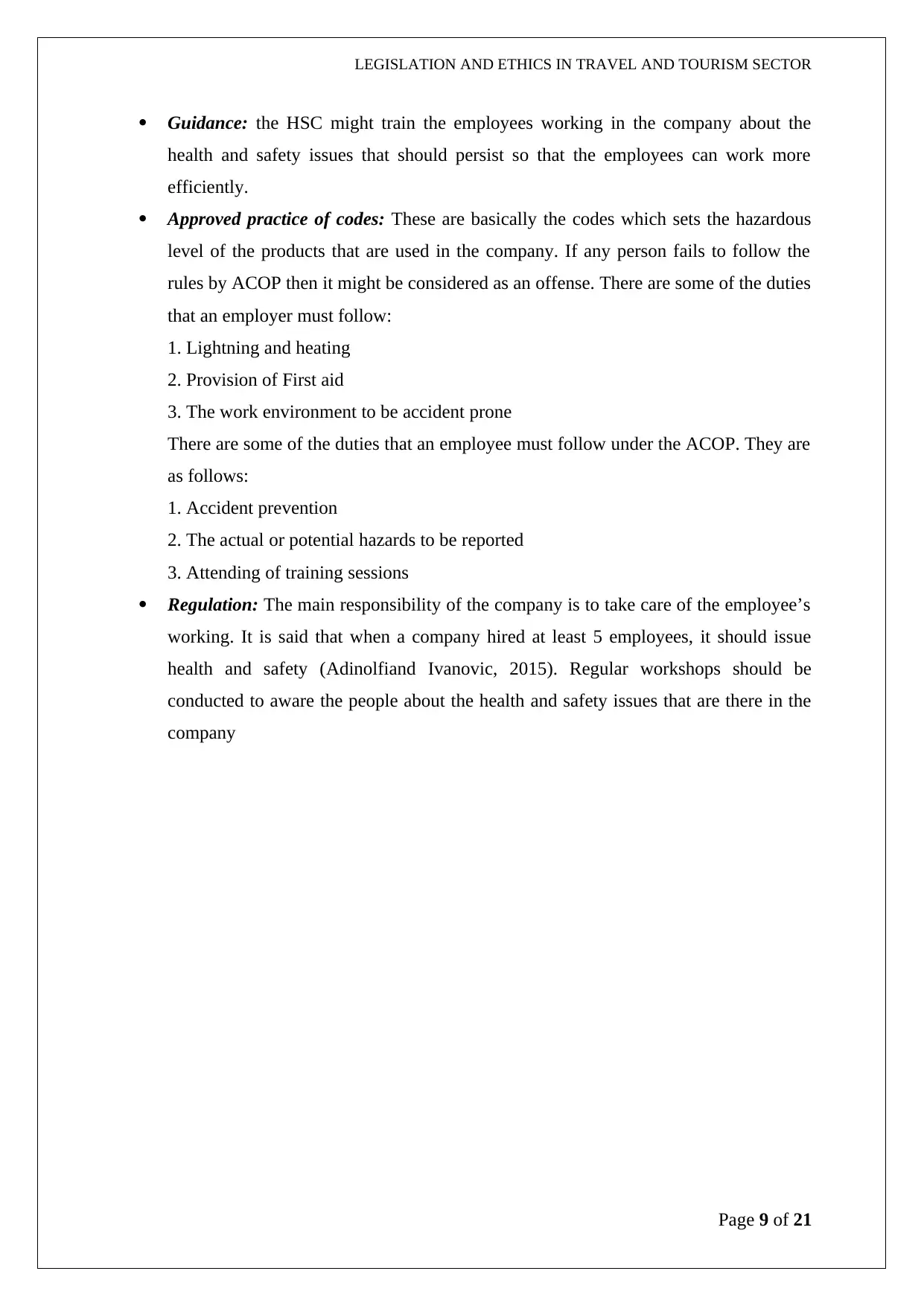
LEGISLATION AND ETHICS IN TRAVEL AND TOURISM SECTOR
Guidance: the HSC might train the employees working in the company about the
health and safety issues that should persist so that the employees can work more
efficiently.
Approved practice of codes: These are basically the codes which sets the hazardous
level of the products that are used in the company. If any person fails to follow the
rules by ACOP then it might be considered as an offense. There are some of the duties
that an employer must follow:
1. Lightning and heating
2. Provision of First aid
3. The work environment to be accident prone
There are some of the duties that an employee must follow under the ACOP. They are
as follows:
1. Accident prevention
2. The actual or potential hazards to be reported
3. Attending of training sessions
Regulation: The main responsibility of the company is to take care of the employee’s
working. It is said that when a company hired at least 5 employees, it should issue
health and safety (Adinolfiand Ivanovic, 2015). Regular workshops should be
conducted to aware the people about the health and safety issues that are there in the
company
Page 9 of 21
Guidance: the HSC might train the employees working in the company about the
health and safety issues that should persist so that the employees can work more
efficiently.
Approved practice of codes: These are basically the codes which sets the hazardous
level of the products that are used in the company. If any person fails to follow the
rules by ACOP then it might be considered as an offense. There are some of the duties
that an employer must follow:
1. Lightning and heating
2. Provision of First aid
3. The work environment to be accident prone
There are some of the duties that an employee must follow under the ACOP. They are
as follows:
1. Accident prevention
2. The actual or potential hazards to be reported
3. Attending of training sessions
Regulation: The main responsibility of the company is to take care of the employee’s
working. It is said that when a company hired at least 5 employees, it should issue
health and safety (Adinolfiand Ivanovic, 2015). Regular workshops should be
conducted to aware the people about the health and safety issues that are there in the
company
Page 9 of 21
⊘ This is a preview!⊘
Do you want full access?
Subscribe today to unlock all pages.

Trusted by 1+ million students worldwide
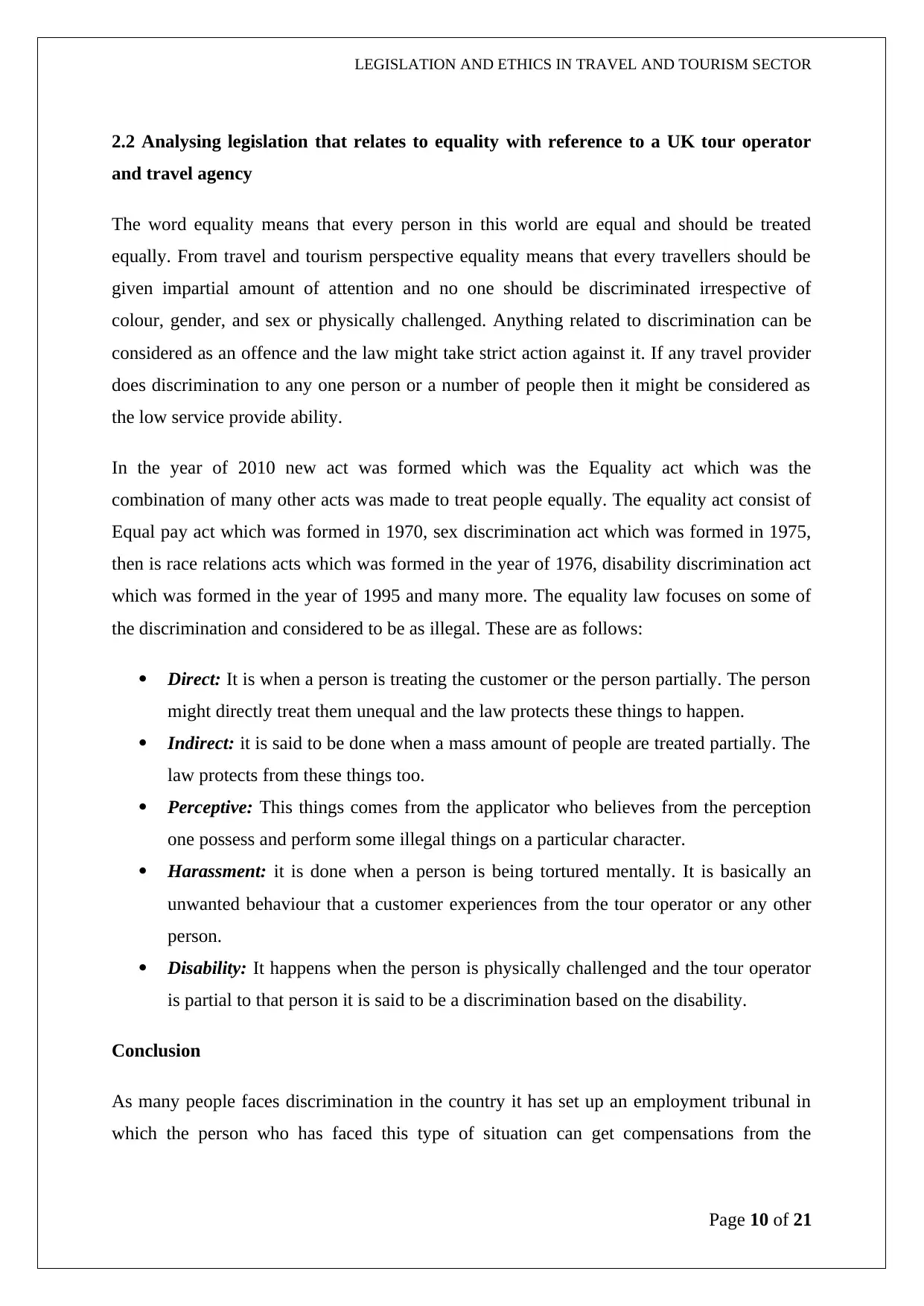
LEGISLATION AND ETHICS IN TRAVEL AND TOURISM SECTOR
2.2 Analysing legislation that relates to equality with reference to a UK tour operator
and travel agency
The word equality means that every person in this world are equal and should be treated
equally. From travel and tourism perspective equality means that every travellers should be
given impartial amount of attention and no one should be discriminated irrespective of
colour, gender, and sex or physically challenged. Anything related to discrimination can be
considered as an offence and the law might take strict action against it. If any travel provider
does discrimination to any one person or a number of people then it might be considered as
the low service provide ability.
In the year of 2010 new act was formed which was the Equality act which was the
combination of many other acts was made to treat people equally. The equality act consist of
Equal pay act which was formed in 1970, sex discrimination act which was formed in 1975,
then is race relations acts which was formed in the year of 1976, disability discrimination act
which was formed in the year of 1995 and many more. The equality law focuses on some of
the discrimination and considered to be as illegal. These are as follows:
Direct: It is when a person is treating the customer or the person partially. The person
might directly treat them unequal and the law protects these things to happen.
Indirect: it is said to be done when a mass amount of people are treated partially. The
law protects from these things too.
Perceptive: This things comes from the applicator who believes from the perception
one possess and perform some illegal things on a particular character.
Harassment: it is done when a person is being tortured mentally. It is basically an
unwanted behaviour that a customer experiences from the tour operator or any other
person.
Disability: It happens when the person is physically challenged and the tour operator
is partial to that person it is said to be a discrimination based on the disability.
Conclusion
As many people faces discrimination in the country it has set up an employment tribunal in
which the person who has faced this type of situation can get compensations from the
Page 10 of 21
2.2 Analysing legislation that relates to equality with reference to a UK tour operator
and travel agency
The word equality means that every person in this world are equal and should be treated
equally. From travel and tourism perspective equality means that every travellers should be
given impartial amount of attention and no one should be discriminated irrespective of
colour, gender, and sex or physically challenged. Anything related to discrimination can be
considered as an offence and the law might take strict action against it. If any travel provider
does discrimination to any one person or a number of people then it might be considered as
the low service provide ability.
In the year of 2010 new act was formed which was the Equality act which was the
combination of many other acts was made to treat people equally. The equality act consist of
Equal pay act which was formed in 1970, sex discrimination act which was formed in 1975,
then is race relations acts which was formed in the year of 1976, disability discrimination act
which was formed in the year of 1995 and many more. The equality law focuses on some of
the discrimination and considered to be as illegal. These are as follows:
Direct: It is when a person is treating the customer or the person partially. The person
might directly treat them unequal and the law protects these things to happen.
Indirect: it is said to be done when a mass amount of people are treated partially. The
law protects from these things too.
Perceptive: This things comes from the applicator who believes from the perception
one possess and perform some illegal things on a particular character.
Harassment: it is done when a person is being tortured mentally. It is basically an
unwanted behaviour that a customer experiences from the tour operator or any other
person.
Disability: It happens when the person is physically challenged and the tour operator
is partial to that person it is said to be a discrimination based on the disability.
Conclusion
As many people faces discrimination in the country it has set up an employment tribunal in
which the person who has faced this type of situation can get compensations from the
Page 10 of 21
Paraphrase This Document
Need a fresh take? Get an instant paraphrase of this document with our AI Paraphraser
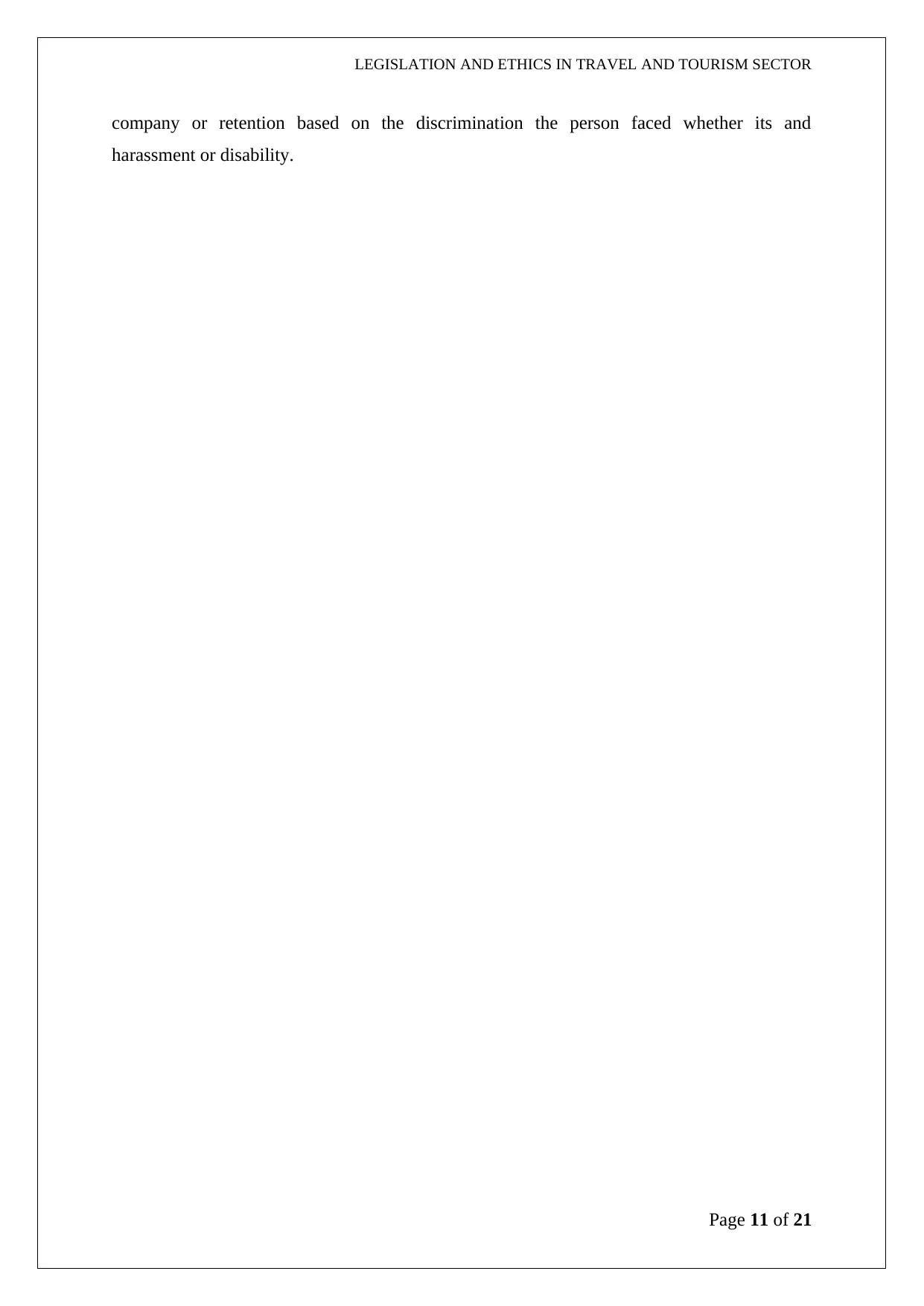
LEGISLATION AND ETHICS IN TRAVEL AND TOURISM SECTOR
company or retention based on the discrimination the person faced whether its and
harassment or disability.
Page 11 of 21
company or retention based on the discrimination the person faced whether its and
harassment or disability.
Page 11 of 21
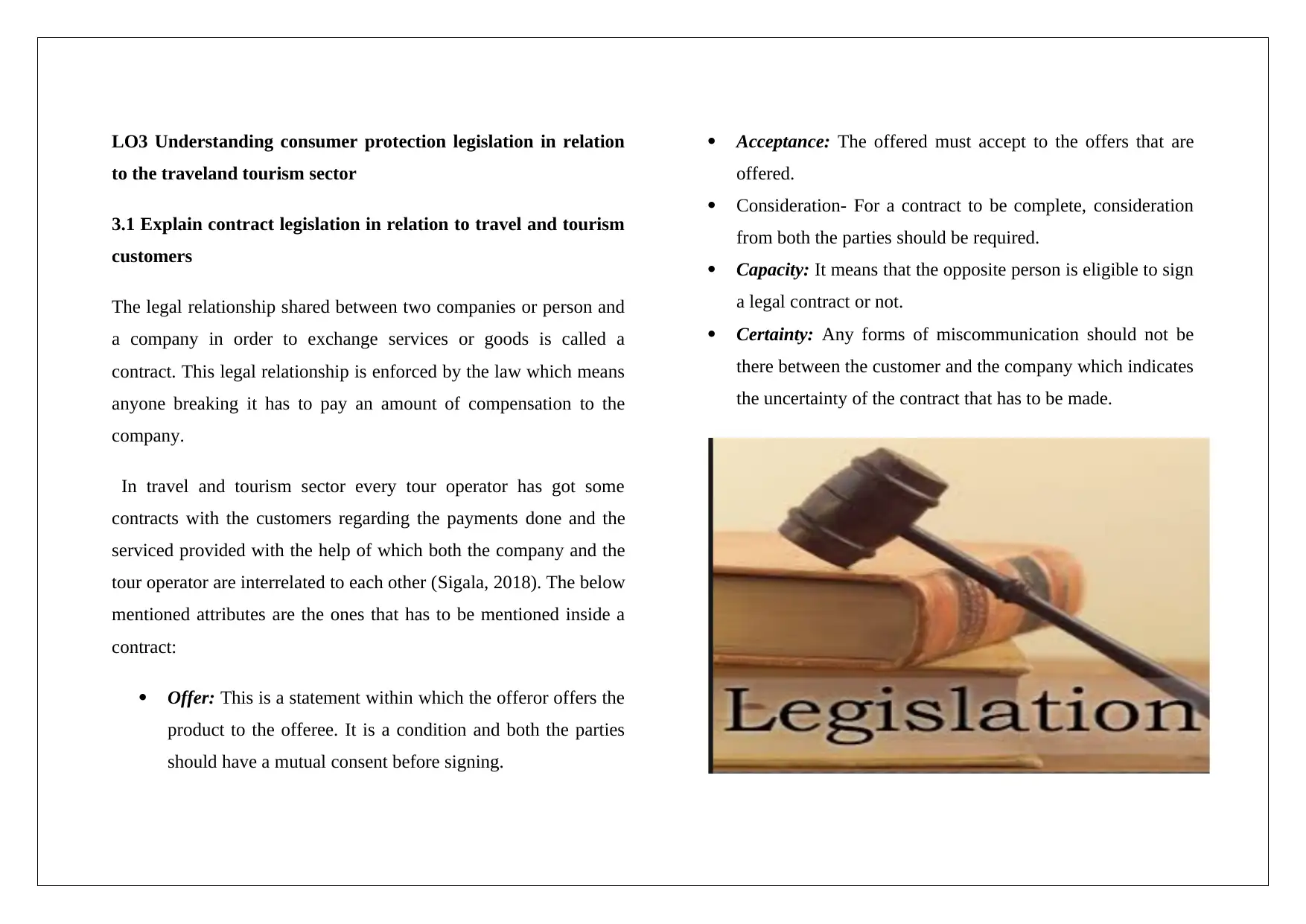
LO3 Understanding consumer protection legislation in relation
to the traveland tourism sector
3.1 Explain contract legislation in relation to travel and tourism
customers
The legal relationship shared between two companies or person and
a company in order to exchange services or goods is called a
contract. This legal relationship is enforced by the law which means
anyone breaking it has to pay an amount of compensation to the
company.
In travel and tourism sector every tour operator has got some
contracts with the customers regarding the payments done and the
serviced provided with the help of which both the company and the
tour operator are interrelated to each other (Sigala, 2018). The below
mentioned attributes are the ones that has to be mentioned inside a
contract:
Offer: This is a statement within which the offeror offers the
product to the offeree. It is a condition and both the parties
should have a mutual consent before signing.
Acceptance: The offered must accept to the offers that are
offered.
Consideration- For a contract to be complete, consideration
from both the parties should be required.
Capacity: It means that the opposite person is eligible to sign
a legal contract or not.
Certainty: Any forms of miscommunication should not be
there between the customer and the company which indicates
the uncertainty of the contract that has to be made.
to the traveland tourism sector
3.1 Explain contract legislation in relation to travel and tourism
customers
The legal relationship shared between two companies or person and
a company in order to exchange services or goods is called a
contract. This legal relationship is enforced by the law which means
anyone breaking it has to pay an amount of compensation to the
company.
In travel and tourism sector every tour operator has got some
contracts with the customers regarding the payments done and the
serviced provided with the help of which both the company and the
tour operator are interrelated to each other (Sigala, 2018). The below
mentioned attributes are the ones that has to be mentioned inside a
contract:
Offer: This is a statement within which the offeror offers the
product to the offeree. It is a condition and both the parties
should have a mutual consent before signing.
Acceptance: The offered must accept to the offers that are
offered.
Consideration- For a contract to be complete, consideration
from both the parties should be required.
Capacity: It means that the opposite person is eligible to sign
a legal contract or not.
Certainty: Any forms of miscommunication should not be
there between the customer and the company which indicates
the uncertainty of the contract that has to be made.
⊘ This is a preview!⊘
Do you want full access?
Subscribe today to unlock all pages.

Trusted by 1+ million students worldwide
1 out of 21
Related Documents
Your All-in-One AI-Powered Toolkit for Academic Success.
+13062052269
info@desklib.com
Available 24*7 on WhatsApp / Email
![[object Object]](/_next/static/media/star-bottom.7253800d.svg)
Unlock your academic potential
Copyright © 2020–2026 A2Z Services. All Rights Reserved. Developed and managed by ZUCOL.
